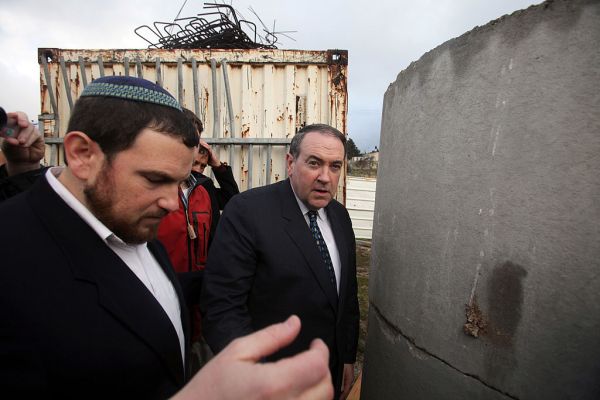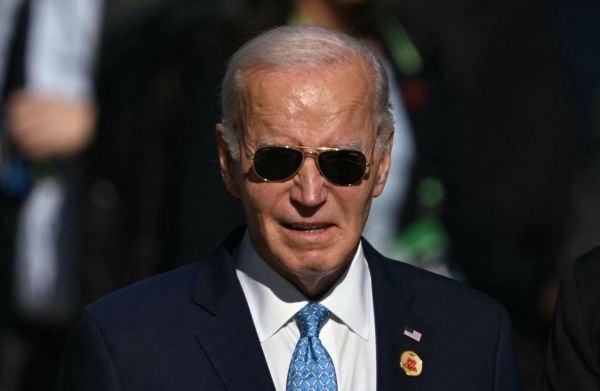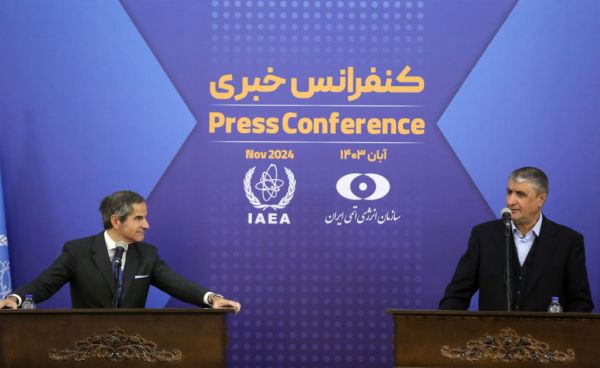TEL AVIV, Israel—Families across the country this week marked the beginning of Passover, a Jewish holiday that commemorates the Israelites’ exodus from Egypt, with an empty seat at their Seder tables. For many, the celebration of biblical liberation from slavery felt incongruous with Israel’s present tragedy: 133 hostages remain in terrorist captivity while hopes for their release dim with each passing day.
“Time is not running out. It already has,” Mai Albini, the grandson of 80-year-old Chaim Peri, said ahead of Passover. “How can we celebrate such a holiday while 133 people are still without their freedom, still waiting to be liberated?”
It’s just one of many holidays, anniversaries, and birthdays that have come and gone in the 200 days since Hamas fighters poured into Israel on October 7, killing 1,200 people—mostly civilians—and abducting 253 others, including several American citizens, and taking them to the Gaza Strip. Of the 133 who remain today, as many as 50 could now be dead, according to an Israeli assessment. To the hostages’ friends and families, each passing milestone serves as a painful reminder of the uncertain fate of their loved ones.
“Today is not a happy Passover,” wrote a representative of Kibbutz Nir Oz, where terrorists destroyed an estimated 80 percent of the southern community’s homes and killed or kidnapped a quarter of its residents, in a Facebook post Tuesday. “This night will be no different to all the nights before it—the suffering, the anger, the disappointment, the despair, the shame, the abandonment—all of it is still relevant today. The dreadful conditions, the abuse, the hunger, the fear, the lack of sleep and the danger to the lives of the abductees who aren’t already dead are all still relevant.”
As Israeli families gathered for the first evening of Passover on Monday, Nir Oz native Shiri Bibas marked her 33rd birthday in Gaza. Terrorists abducted the mother, her husband Yarden, and their two young boys—the redheaded Ariel and Kfir—more than six months ago. Kfir, the youngest child taken hostage, turned 1 on January 18.
“There were cakes and balloons. People bought him presents. The only thing that was missing was the child himself,” Yosi Shnaider, Shiri’s cousin, told The Dispatch from Tel Aviv. “Kfir is supposed to walk right now, is supposed to speak, to say his first word, is supposed to see colors and hear stories and songs. Instead of that, he’s been locked in some dark place.”
Shnaider was the first family member to watch the now-widely circulated video of Shiri clutching her two young sons as gunmen surrounded her on October 7—a “nightmare” eventually followed by the discovery that Shiri’s elderly parents, Yossi and Margit Silberman, had been burned to death in their Nir Oz home.
For Shnaider and other family members of hostages, each passing day brings new anguish. And internationally mediated negotiations to secure the hostages’ release show few signs of a coming breakthrough. After participating in the talks in Cairo, CIA Director Bill Burns said last week that Hamas had once again rejected a U.S.-backed hostage deal proposal despite Israeli concessions. State Department spokesman Matthew Miller likewise said on Tuesday that Hamas had “moved the goalposts.” The terror group is now reportedly demanding the release of 30 Palestinian prisoners per civilian captive and 50 prisoners per female soldier held.
Hamas may feel empowered to raise the price of the hostages’ freedom by the growing apathy or outright animus toward Israel on display in the United States. At Columbia University this week, hundreds of pro-Palestinian students occupied portions of campus, at times voicing overt support for Hamas. In one video, a kaffiyeh-clad man vows to repeat the October 7 massacre “10,000 times” to the cheers of fellow protesters. In another, a group chants “Hamas we love you” and “burn Tel Aviv to the ground.”
As pro-Palestinian encampments and accompanying demonstrations have spread among universities across the nation, President Joe Biden condemned the “antisemitic protests” but added: “I also condemn those who don’t understand what’s going on with the Palestinians.” The comment contributed to growing concerns that Washington is trying to distance itself from Israel, thereby strengthening Hamas’ hand in hostage deal negotiations.
Meanwhile, leading political figures, activists, and celebrities typically outspoken on human rights issues have equivocated or stayed quiet about the plight of the abductees—a silence that grows more pronounced with each passing day that men, women, and children languish in Hamas captivity.
“It makes me very angry that many in the arts—musicians, Hollywood—have been so silent,” John Ondrasik, an American musician best known by his stage name, Five for Fighting, told The Dispatch. “I played the Concert for New York after 9/11. … Everybody was there, condemning Osama bin Laden, giving solace to New York City and America. The music industry likes to pride itself on being on the front edge of human rights. How do you explain this moral paralysis of the world?”
Ondrasik recently visited Israel, where he led a jam session in honor of Evyatar David, a 23-year-old musician captured by Hamas. David was among the 40 people kidnapped from the Nova music festival on October 7, when Hamas gunmen descended on the event in trucks and on paragliders to kill attendees indiscriminately. By the day’s end, the terrorist attackers murdered an estimated 364 people there—nearly a third of the total October 7 casualties. David’s older brother Ilay thought he was one of them, before seeing footage of Evyatar in Gaza.
“I was prepared to bury him. But then, at 2 p.m., we got links to Telegram videos which showed my brother inside the Gaza Strip. He was tied and dragged inside the Strip,” Ilay said in an interview from Tel Aviv. “The terrorists made sure that we would recognize all of them. They really filmed their faces closely, some of them were yelling their names. They looked straight into the camera with a real fear of death.”
Hamas used the hostages, and the friends and family awaiting their return, to influence the trajectory of the war that followed, turning Israel’s “no one left behind” policy against it to extract maximum concessions in negotiations. Israel has, in the past, released as many as 1,000 Palestinian prisoners for the safe return of one soldier.
“Life, in our belief, is the most important thing ever,” Galya David, Evyatar’s mother, told The Dispatch. Asked whether she thinks the government is doing everything it can to secure his release, Galya answered: “I must believe so. They’re responsible for my son and others. This is my country. I have no place to go. I must feel safe here.”
In the meantime, she leans on her family to get through each day. “I don’t think about tomorrow too much, because I need my power everyday, for that day,” she said. “And I must keep going, because I need to be strong for him when Evyatar comes home.”
The release of 112 hostages in a November exchange gave the remaining captives’ family members new, horrific insight into the kinds of abuses their loved ones still face. The freed hostages described being kept in tunnels and cages, drugged, beaten, and witnessing or being subjected to sexual violence while in Gaza. Renana Eitan, the head of psychiatry at the Ichilov Tel Aviv medical center, said in December that the abductees she treated had experienced the worst trauma she had witnessed in her career.
“Somebody is sitting in front of me, but he’s dead. His eyes are dead, there is no soul inside of them,” Shnaider, Shiri Bibas’ cousin, said of the former hostages he has encountered. “They’re black. It’s a very scary thing.”
Amit Soussana, a 40-year-old attorney from Kfar Aza, in March became the first freed hostage to speak publicly about her sexual assault while in Gaza. In an interview with the New York Times, Soussana described being harassed, groped, and forced at gunpoint to commit sex acts on her terrorist captor. Fourteen women still presumed to be alive remain in such conditions, yet International Women’s Day passed last month with little to no outcry from the UN Entity for Gender Equality and the Empowerment of Women and other international women’s rights groups.
Released hostages also came bearing news about those left behind. That’s how Talya Dancyg, the granddaughter of 75-year-old Alex Dancyg, learned about the inhumane treatment her grandfather endured after his kidnapping.
“There were three old people taken inside a van with the terrorists, guns pointing at them on their way to Gaza. When they entered Gaza, before they were taken to the tunnels underground, they were beaten by the angry and furious crowd,” the 18-year-old Talya said of her grandfather, who dedicated his life to studying the Holocaust. “My grandfather is 75, an old and ill man. … He doesn’t deserve it. No human being deserves it.”
The oldest Israeli taken on October 7, Shlomo Mantzur, also remains a hostage. Terrorists abducted the 86-year-old from his home in Kibbutz Kissufim, where he built a life after fleeing antisemitic violence in Iraq, where he was born. At the age of 3, Mantzur narrowly survived the 1941 Farhud Massacre, in which 180 Jewish men, women, and children were murdered in Baghdad during the holiday of Shavuot. The pogrom is considered by some historians to be a part of the Holocaust, given wartime Iraq’s ties to Nazi Germany.
“On October 7, he went through a second Holocaust,” Noam Safir, Mantzur’s 20-year-old granddaughter, said ahead of Passover. “My grandfather was handcuffed, beaten, and kidnapped in his own car from his own home while still wearing his sleepwear.”
“He should live the life he has left to live surrounded by his loved ones,” Safir added. “Let our loved ones go. Let my grandpa go.”









Please note that we at The Dispatch hold ourselves, our work, and our commenters to a higher standard than other places on the internet. We welcome comments that foster genuine debate or discussion—including comments critical of us or our work—but responses that include ad hominem attacks on fellow Dispatch members or are intended to stoke fear and anger may be moderated.
You are currently using a limited time guest pass and do not have access to commenting. Consider subscribing to join the conversation.
With your membership, you only have the ability to comment on The Morning Dispatch articles. Consider upgrading to join the conversation everywhere.